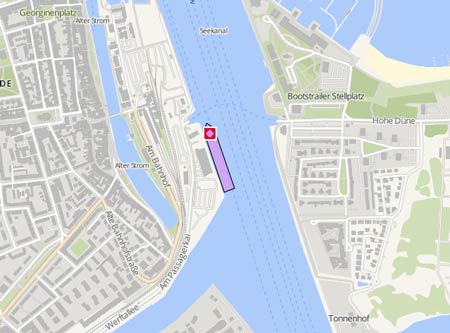GAIA BLU
Kurs/Position
Die letzten Häfen
Die letzten Wegpunkte
Die neuesten Nachrichten
Deep-sea research vessel returning to shore
After one month out at sea testing the new remotely operated vehicle Subastian, the Schmidt Ocean Institute Research vessel Falkor is now on its way back to shore. The 25-day trip through waters surrounding Guam included roughly 100 hours of underwater dives at depths up to 4,500 meters. Communications manager Carlie Weiner told KUAM News, "We'll be back in November for our science verification cruise and for our first research cruise in the Mariana Back Arc in late-November, and that's going to be a repeat visit for us we were here last year." The November cruise will revisit three hydrothermal vents the ship discovered last year. And with the newly tested ROV Subastian on board, scientists will be able to get a closer look at the biology and ecosystems surrounding those vents. All data collected from the cruise will be openly available to the public and scientists around the world. http://www.kuam.com/story/32827685/2016/08/24/deep-sea-research-vessel-returning-to-shore
Google-funded sea research vessel sets sail
The research ship "Falcor" is seen at dock Thursday, Aug. 1, 2013, in San Francisco. The $60 million ship funded by a Google executive is setting sail from San Francisco to study a so-called "dead zone" in the Pacific Ocean and other mysteries of the sea. The ship carries an unmanned submarine that will travel deep into the ocean off Vancouver Island to study an area where all sea life dies each year from a periodic lack of oxygen. The Falcor is funded by the Schmidt Ocean Science Institute, which was co-founded by Google executive Eric Schmidt and his wife, Wendy. http://www.statesmanjournal.com/viewart/20130801/UPDATE/130801033/Google-funded-sea-research-vessel-sets-sail-
Research vessel embarks on mission to Deepwater Horizon spill
The Schmidt Ocean Institute's research vessel "Falkor", the former German "Seefalke", on Nov 6, 2012, embarked on a science mission from the Port of Pascagoula on a month-long research mission which will take along 12 scientists representing seven institutions to the site of the "Deepwater Horizon" spill. On board the "Falkor" are ROVs that will dive 10,000 feet deep to compare sediments and coral near the spill to the sediments and coral near areas of natural oil seeps. The overall goal was to see what the effects are of oil in the deep ocean environment and to understand better the fate and effects of the oil once it's released. The "Falkor" will work in conjunction on this study with the r/v "Pelican", which will depart from Louisiana on Nov 10. The mission was funded by BP's Gulf of Mexico Research Initiative. They are funding eight studies over three years for a total of $110 million. This study by the Ecosystem Impacts of Oil and Gas Inputs to the Gulf team led by Raymond Highsmith of the University of Mississippi costs about $11 million. The ECOGIG team plans to sample the oil on the Gulf floor that is now covered with sediment.
News schreiben

